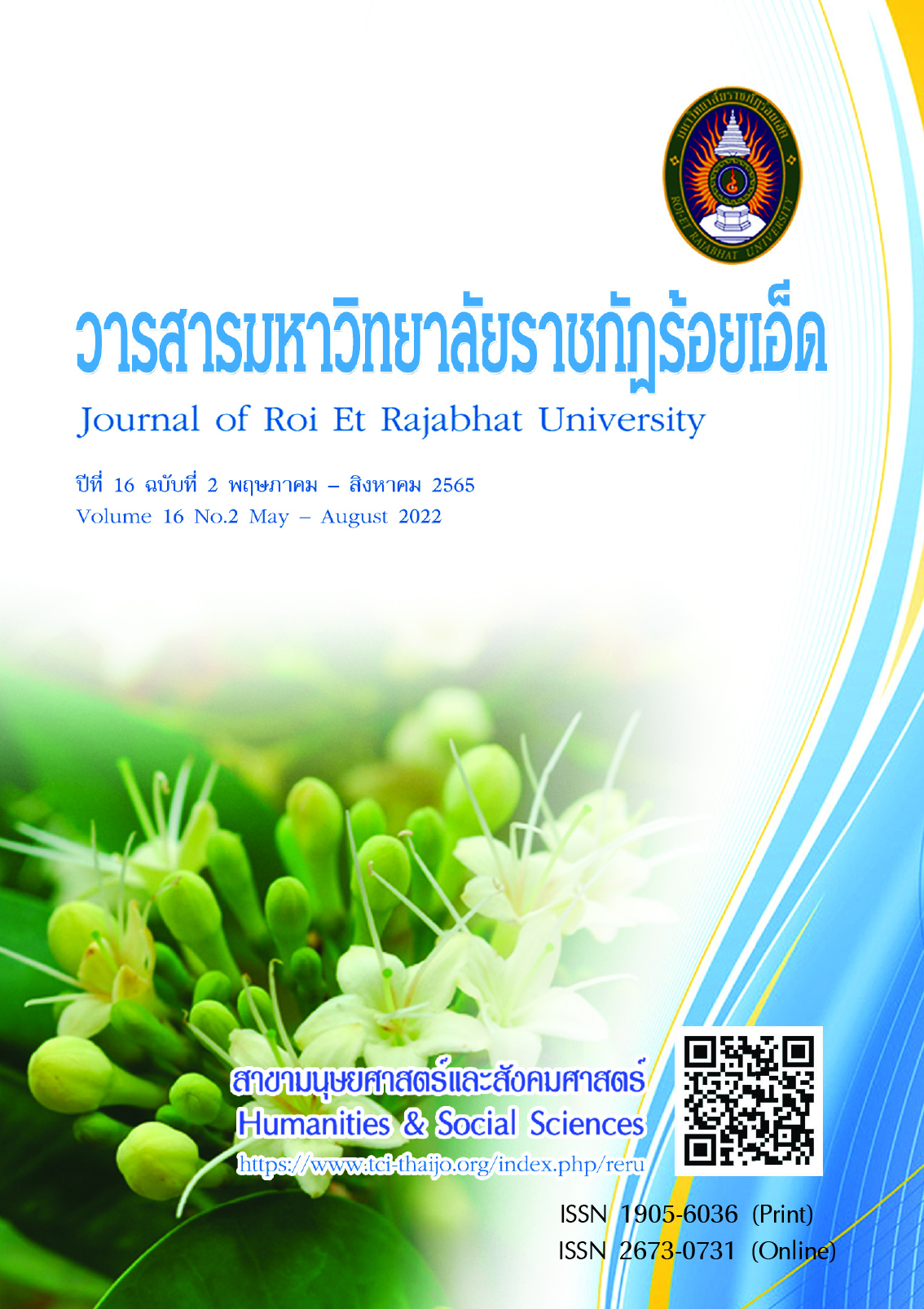Learning Development through Project Based Learning to Promote Creative Economy Concept under the Professional Learning Community Process for Economics Subject of Grade 10 Students
Abstract
The purposes of this study were 1) to examine the implementation of professional learning community (PLC) into project-based learning in order to promote creative economy concept and 2) to study learning and teaching management of learner-centered approach and students’ opinions in the Economics subject. The research design was action research. The sample included forty grade 10 students enrolled in Mahasarakham University Demonstration School (Secondary) in the first semester of the academic year 2020. They were obtained through purposive sampling. The instruments for data collection included a group discussion form, a teaching observation form, teaching logs, and an opinion questionnaire. Statistics for data collection were mean, standard deviation, and content analysis.
Based on the findings, it was suggested that a network across different departments should be built as the Economics subject shares content in Career and Technology Department and Science Department. School staff were capable of doing the professional learning community projects. The learning was designed in the form of a project with 6 STEM steps. As the teachers’ role in the professional learning community was coaching and mentoring, they kept the students more engaged in local wisdom and creative development.
The results of the learning and teaching management also showed that local wisdom was incorporated into product development. The most selected local wisdom among the students was food products, and the second most was Thai herbs. Raw materials for product development were available
in the community nearby. The students’ overall opinions toward this learning and teaching management were at a “high level.” The top three opinions were “I like the measurement and evaluation of this learning activity”, “I like the learning materials used in the Economics subject,” and “I like that this learning activity provided a mentor for each group” respectively.
References
กรมวิชาการ. (2542). ภูมิปัญญาท้องถิ่นกับการพัฒนาหลักสูตรและการจัดการเรียนการสอน. กรุงเทพฯ: คุรุสภาลาดพร้าว.
กระทรวงศึกษาธิการ. (2545). พระราชบัญญัติการศึกษาแห่งชาติ พ.ศ. 2542 และที่แก้ไขเพิ่มเติม (ฉบับที่ 2) พ.ศ. 2545. กรุงเทพฯ: องค์การรับส่งสินค้าและพัสดุภัณฑ์.
ชลิต อิฐไธสง. (2561). การจัดการเรียนรู้ประวัติศาสตร์บ้านช่องแมว โดยใช้เทคนิคการจัดการเรียนรู้แบบโครงงานนักเรียนชั้นประถมศึกษาปีที่ 5. วารสารมนุษยศาสตร์และสังคมศาสตร์ มหาวิทยาลัยราชภัฏสุรินทร์, 19(1), 69-82.
ชูชาติ พ่วงสมจิตร์. (2558). ชุมชนการเรียนรู้ทางวิชาชีพ. กรุงเทพฯ: ม.ป.ท..
บุญชม ศรีสะอาด. (2543). การวิจัยเบื้องต้น. กรุงเทพฯ: สุวีริยาสาส์น.
พิชิต ฤทธิ์จรูญ. (2550). หลักการวัดและประเมิลผลการศึกษา (พิมพ์ครั้งที่ 4). กรุงเทพฯ: เฮ้าส์ออฟ เคอร์มิสท์.
รัติยา ไกรสัย. (2554). กลยุทธ์การตลาด และการจัดการเชิงกลยุทธ์ในธุรกิจผลิตจำหน่ายเครื่องดื่มชาเขียว กรณีศึกษา บริษัทโออิชิ กรุ๊ป จำกัด(มหาชน). วิทยานิพนธ์ บริหารธุรกิจมหาบัณฑิต สาขาวิชาการตลาด. กรุงเทพฯ: มหาวิทยาลัยหอการค้าไทย.
เรวดี ชัยเชาวรัตน์. (2558). วิถีสร้างครูสู่ศิษย์ : ชุมชนการเรียนรู้ทางวิชาชีพ : เอกสาร ประมวลแนวคิดและแนวทางพัฒนาวิชาชีพครูสำหรับคณะทำงานโครงการพัฒนาระบบกลไกและแนวทางการหนุนเสริมชุมชนการเรียนรู้ทางวิชาชีพ เพื่อพัฒนาผู้เรียน. กรุงเทพฯ: สำนักงานส่งเสริมสังคมแห่งการเรียนรู้และคุณภาพเยาวชน.
ลัดดา ภู่เกียรติ. (2552). การสอนแบบโครงงานและการสอนแบบใช้วิจัยเป็นฐาน: งานที่ครูประถมทำได้. กรุงเทพฯ: สาฮะแอนด์ซันพริ้นติ้ง.
วริศรา ไกรจิตเมตต์. (2545). ผลการใช้ภูมิปัญญาท้องถิ่นในการจัดการเรียนการสอนวิชาวิทยาศาสตร์ เรื่องผลผลิตทางการเกษตรและการจัดการ. วิทยานิพนธ์ ศึกษาศาสตรมหาบัณฑิต สาขาวิชาหลักสูตรและการสอน. เชียงใหม่: มหาวิทยาลัยเชียงใหม่.
สำนักงานคณะกรรมการการศึกษาแห่งชาติ. (2541). รัฐธรรมนูญแห่งราชอาณาจักรไทยพุทธศักราช 2540. กรุงเทพฯ: โรงพิมพ์การศาสนา.
อาคม เติมพิทยาไพสิฐ. (2554). แผนการศึกษาแห่งชาติ (พ.ศ. 2545-2559). ฐานข้อมูลคอมพิวเตอร์ สำนักงานคณะกรรมการพัฒนาการเศรษฐกิจและสังคมแห่งชาติ. สืบค้นเมื่อ 11 พฤษภาคม 2563, จาก http://www.nesdb.go.th/Portals/0/news/research/research_0356200611.pdf
อินทิรา หิรัญสาย. (2545). ภูมิปัญญาเพื่อการปฏิรูปการศึกษา. วารสารวิชาการ, 5(10), 18-22.
Calcasola. 2009). Episode-based performance measurement and payment: Making it a reality. Health Aff (Millwood), 28(5),1406-1417.
Kemmis, S. and McTaggart, R. (1988). The Action Research Planner. Victoria: Deakin University Press.
Leonard, J. J. (2003). The physical properties of compost. Compost. Science & Utilization, 11(3), 238–264.
Ravitz, J. (2008). Project-based learning as a Catalyst. AERA-NewYork, 27(3), 1-3.
Downloads
Published
How to Cite
Issue
Section
License
Copyright (c) 2022 Roi Et Rajabhat University

This work is licensed under a Creative Commons Attribution-NonCommercial-NoDerivatives 4.0 International License.
บทความที่ได้รับการตีพิมพ์เป็นลิขสิทธิ์ของวารสารมหาวิทยาลัยราชภัฎร้อยเอ็ด
ข้อความที่ปรากฏในบทความแต่ละเรื่องในวารสารวิชาการเล่มนี้เป็นความคิดเห็นส่วนตัวของผู้เขียนแต่ละท่านไม่เกี่ยวข้องกับมหาวิทยาลัยราชภัฎร้อยเอ็ด และคณาจารย์ท่านอื่นๆในมหาวิทยาลัยฯ แต่อย่างใด ความรับผิดชอบองค์ประกอบทั้งหมดของบทความแต่ละเรื่องเป็นของผู้เขียนแต่ละท่าน หากมีความผิดพลาดใดๆ ผู้เขียนแต่ละท่านจะรับผิดชอบบทความของตนเองแต่ผู้เดียว





